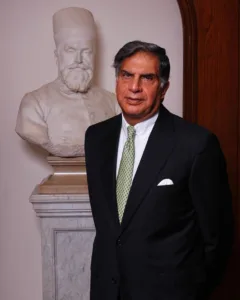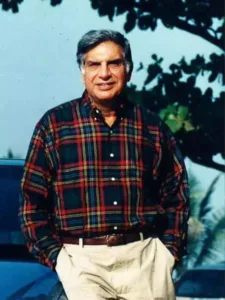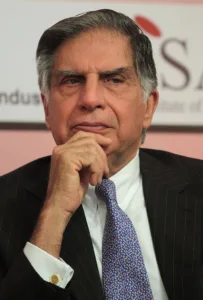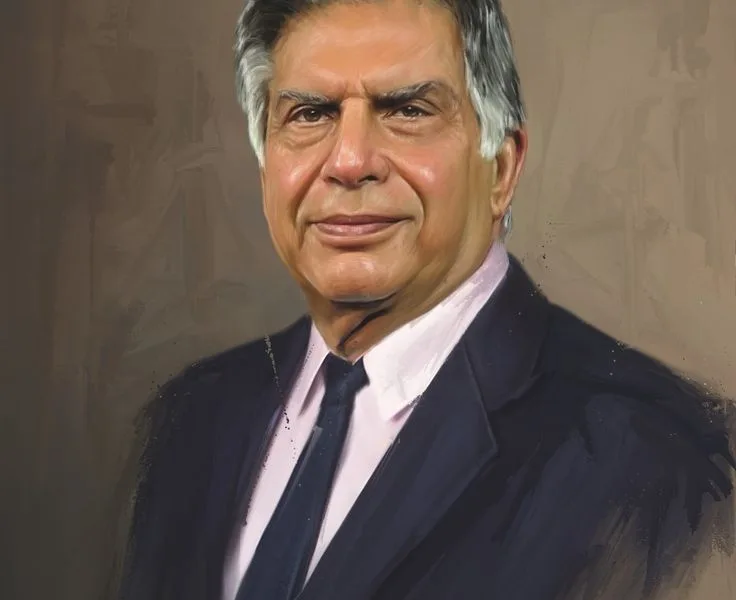A Tribute to Ratan Tata: the man with 100% golden heart and 0% haters. The real hero of 21st century.
A Tribute to Ratan Tata: A Visionary Leader and Humanitarian and a great donor
Ratan Naval Tata, the former chairman of Tata Sons and Tata Group, is a name synonymous with visionary leadership, corporate integrity, and humanitarian. His legacy transcends the business world, marking him as one of the most respected and admired leaders not just in India, but globally. Though, as of the last information, Ratan Tata is alive and continuing to contribute to society, this essay is a hypothetical tribute that reflects on his remarkable contributions and the enduring impact he has had on both the corporate world and humanity.
Early Life and Legacy of the Tata Family:
Ratan Tata was born on December 28, 1937, into the prestigious Tata family, one of India’s most influential industrial dynasties. The Tata Group, founded by Jamsetji Tata in 1868, had long been a symbol of industrial progress in India, making significant contributions to sectors like steel, automobiles, information technology, and telecommunications. Ratan Tata was the great-grandson of Jamsetji Tata and was raised within the framework of a family known for its ethical business practices, philanthropy, and commitment to nation-building.
After his parents separated when he was a child, Ratan Tata was raised by his grandmother, Lady Navajbai Tata, who had a profound influence on his character. His early education was in India, followed by higher studies at Cornell University in the U.S., where he earned a degree in architecture and structural engineering. He later attended the Advanced Management Program at Harvard Business School, further honing his skills as a leader. His education and exposure to global business practices helped him mold a vision that would reshape the Tata Group and enhance its global footprint.
Leadership of the Tata Group

A Tribute to Ratan Tata. Pic credit: Pinterest.
When Ratan Tata took over as chairman of Tata Sons in 1991, the company was already a well-established name in India. However, under his leadership, Tata Group became a truly global conglomerate, acquiring international companies and establishing a presence in over 100 countries. At the time, many doubted whether he could fill the shoes of his predecessor, J.R.D. Tata, but Ratan Tata soon proved that he was not only capable of continuing the legacy but also of taking it to unprecedented heights.
One of the most significant milestones of his tenure was the acquisition of British steelmaker Corus in 2007, followed by the purchase of the iconic automobile brands Jaguar and Land Rover (JLR) in 2008. These acquisitions were game-changers for Tata Motors, transforming it from an Indian manufacturer of commercial vehicles into a global player in the automobile industry. Many had been skeptical about the acquisitions, particularly the JLR deal, but Ratan Tata’s strategic insight paid off. JLR turned into a profitable venture and became a key pillar of Tata Motors’ growth story.
His vision also extended to innovation within India, as demonstrated by the creation of the Tata Nano. Launched in 2008, the Nano was conceived as the world’s cheapest car, designed to make car ownership accessible to millions of Indian families who could not afford existing models. Although the project faced numerous challenges and did not achieve the expected commercial success, it was a testament to Ratan Tata’s commitment to creating products that could improve the lives of ordinary people.
Under his leadership, the Tata Group diversified into multiple sectors, including telecommunications, information technology, hospitality, and retail. Tata Consultancy Services (TCS), one of the group’s crown jewels, became a global IT services giant and the first Indian company to reach a market capitalization of $100 billion. Ratan Tata’s focus on innovation, global expansion, and ethical business practices helped make the Tata Group one of the most respected and valuable conglomerates in the world.
Ethics, Integrity, and Corporate Governance
Ratan Tata was more than just a successful businessman; he was an advocate for ethical leadership and corporate responsibility. His management style was characterized by humility, integrity, and a strong moral compass, attributes that are often rare in the cutthroat world of global business. Unlike many corporate leaders who prioritize short-term gains, Tata consistently emphasized long-term sustainability and societal impact.
One of the most telling examples of his ethical approach to business was his handling of the Tata Group’s withdrawal from the Singur plant in West Bengal. The Tata Nano project faced severe protests from local farmers and activists who opposed the land acquisition for the plant. Rather than forcefully pursuing the project at the expense of the local population, Tata decided to relocate the plant to Gujarat. This decision, while costly, demonstrated his commitment to corporate social responsibility and respect for community sentiments.
Ratan Tata also prioritized transparency and corporate governance. During his tenure, the Tata Group set high standards for ethical conduct, focusing on fair treatment of employees, respect for the environment, and maintaining a strong corporate governance framework. His emphasis on ethics made the Tata Group a benchmark for other corporations, not just in India but globally. Tata’s commitment to doing business with integrity earned him the trust of stakeholders across the world.
Philanthropy and Social Impact

A Tribute to Ratan Tata. Pic credit: Pinterest.
One of the most remarkable aspects of Ratan Tata’s legacy is his philanthropy. True to the ethos of the Tata family, Ratan Tata believed in using wealth to serve humanity. A significant portion of the Tata Group’s profits is channeled into philanthropic activities through trusts that support education, healthcare, rural development, and the arts. Under Ratan Tata’s leadership, the Tata Trusts became even more active, funding numerous initiatives aimed at improving the lives of the underprivileged.
Perhaps the most notable philanthropic initiative under Ratan Tata’s leadership was the Tata Education and Development Trust’s donation of $28 million to Cornell University, his alma mater, in 2008. The funds were used to provide scholarships to underprivileged students from India, enabling them to access world-class education. Tata’s contributions to education extended far beyond this single donation, with the Tata Trusts funding numerous educational institutions and research centers across India.
Ratan Tata’s philanthropy also extended to healthcare. The Tata Group made significant contributions to the healthcare sector in India, supporting initiatives such as cancer research, public health programs, and the establishment of medical facilities in rural areas. One of the most notable projects was the Tata Memorial Centre, a leading cancer research and treatment facility in Mumbai. Under Ratan Tata’s leadership, the Tata Trusts also launched the Tata Medical Center in Kolkata, providing world-class cancer treatment to patients in Eastern India.
In addition to education and healthcare, Ratan Tata supported various initiatives aimed at improving rural livelihoods. The Tata Trusts funded projects in areas such as clean water, sanitation, and rural development, helping to uplift some of India’s most impoverished communities. His efforts in promoting social welfare underscored his belief that businesses should contribute to the broader social good and not merely focus on profit.
Humility and Personal Life

A Tribute to Ratan Tata. Pic credit: Pinterest.
Despite his immense success and global recognition, Ratan Tata remained a humble and grounded individual. He was known for his simple lifestyle and approachable demeanor. Throughout his life, he maintained a low profile, rarely seeking the limelight, and often attributing the success of the Tata Group to the collective efforts of its employees and stakeholders.
Unlike many other high-profile business leaders, Ratan Tata never married. His personal life was often a topic of speculation, but he remained private about it. His devotion to his work and his philanthropic activities seemed to take precedence over personal pursuits. Nevertheless, he was deeply respected by those who knew him for his kindness, compassion, and generosity.
Ratan Tata is also known for his love of animals, particularly dogs. The Bombay House, the Tata Group’s headquarters, is famous for being a dog-friendly office, a tradition started under Ratan Tata’s leadership. He has often been seen caring for stray dogs and has supported various animal welfare organizations.
The Global Recognition
Ratan Tata’s contribution to business, society, and humanity did not go unnoticed. Over the years, he received numerous awards and honors from governments and institutions around the world. In 2008, he was awarded the Padma Vibhushan, India’s second-highest civilian honor, for his exceptional service to the nation. He was also conferred with several international accolades, including honorary doctorates from leading universities and awards for business excellence.
His leadership and philanthropy earned him a place on the global stage as a thought leader and humanitarian. Tata’s vision for India’s development, combined with his global outlook, helped him build relationships with leaders around the world, from business magnates to political figures. His ability to navigate complex geopolitical landscapes while upholding the values of integrity and service made him a respected figure far beyond the world of business.
Conclusion
Ratan Tata’s life and career represent a unique blend of business acumen, ethical leadership, and selfless philanthropy. He transformed the Tata Group into a global powerhouse while staying true to the core values of the organization—values rooted in serving society and maintaining the highest ethical standards. His vision, humility, and compassion continue to inspire countless individuals and organizations around the world.
As we reflect on his legacy, it becomes evident that Ratan Tata was not just a business leader, but a man who dedicated his life to making the world a better place. Whether through the innovative products he championed, the jobs he created, or the lives he touched through his philanthropy, Ratan Tata’s contributions will continue to have a lasting impact for generations to come.
Ratan Tata is the real hero of this 21st century. He is not only a businessman but he is a great personality with no haters. He has a heart made up of pure gold with full of humanity, kindness and goodness. But alas! He is no more with us present in this world but he will always remain in our heart for forever. Thank You Late Ratan Naval Tata for everything you have done for India and Indians. You are the pride of India.
A small tribute video for Ratan Tata:
